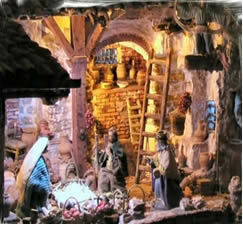Meaning: / Meaning: * “Nella coniugazione di un verb, l'insieme delle uscite che indicates the moment (present, past, future, previous future, imperfetto, remote passage ecc.) in cui avviene l'azione si verb espressa dal verb: coniugare a verb al tense future." / In the conjugation of a verb, the set of verbal endings that indicate the moment (present, past, future, compound future, imperfect, simple more-than-perfect, etc.) where the action takes place or the situation expressed by the verb is verified: conjugate the verb in tense future.
* Definition taken from the Dizionario Italiano Sabatini – Coletti / Casa Editrice Giunti.
Secondo gli autori Maurizio Dardano and Pietro Trifone alla ‘Grammatica Italiana con nozioni di linguistica’: / According to the authors Maurizio Dardano and Pietro Trifone in ‘Grammatica Italiana con nozioni di linguistica’:
“In time, there is a need for the chronological relationship between the moment in which it is concerned and the moment in which it verifies the fact of what is in it; tale relazione può essere di:
/ Time, which specifies the chronological relationship between the moment we speak and the moment we verify the fact we speak of; such relationship can be:• Contemporaneità – when il fatto avviene in the moment in cui si parla (present tense); / Contemporaneity – when the fact happens in a moment that is spoken (present tense);
• Anteriorità – when il fatto avviene in a moment prior to quello in cui si parla (past time); / Priority – when the fact takes place at a time prior to that which is said; (past time);
• Posteriorità - when il fatto avviene in a moment posterior to quello in cui si parla (future tense)." / Posteriority – when the fact happens at a later time than what is said (future tense).
Dopo leggere e capire cosa means, time, ad a language is important to create a general picture in which you see i modi and i tempi the Italian language. / After reading and understanding what time means for a language, it is important to create a general picture where you can see the ways and times in the Italian language.
Interesting sarebbe che attraverso the table below you facesi a paragone painting in the Portuguese and Italian language. Così, resterà più facile capire quello che scrivi and leggi. It is possible to crearlo if accessi i testi su i diversi tempi verbali che sleep al site. Crepi il lupo! / It would be interesting if, through the table below, you could make a comparative chart between Portuguese and Italian. That way, it will be easier to understand what you write and read. It is possible to create it if you access the texts about the most diverse verbal tenses that are on the site. Good luck!
I modi and tempi del verb/ The modes and tenses of the verb
| Indicative | Gift | Passato | Future |
| Gift | Imperfetto | Future Simple | |
| Prossimo Passato | Previous Future | ||
| remote pass | |||
| Trapassato Prossimo | |||
| Remote Trapass | |||
| Conjunctive | Gift | Imperfetto | __ |
| remote pass | |||
| Trapassato | |||
| Conditional | Gift | Passato | __ |
| Imperative | Gift | __ | __ |
| Infinite | Gift | Passato | __ |
| Participle | Gift | Passato | __ |
| Gerund | Gift | Passato | __ |
Isabela Reis de Paula
Brazil School Collaborator
Graduated in Languages with Qualification in Portuguese and Italian
By the Federal University of Rio de Janeiro - UFRJ
Do not stop now... There's more after the advertising ;)
Italian - Brazil School
Would you like to reference this text in a school or academic work? Look:
PAULA, Isabela Reis de. "Picture generale dei tempi e modi verbali"; Brazil School. Available in: https://brasilescola.uol.com.br/italiano/quadro-generale-dei-tempi-modi-verbali.htm. Accessed on June 29, 2021.


